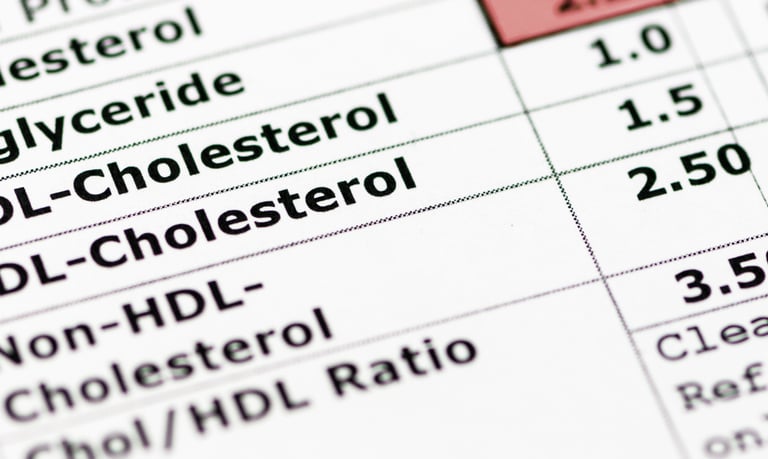Basics of Cholestrol
Understanding cholesterol types (LDL, HDL, VLDL) is crucial for heart health. High LDL raises heart disease risk; HDL removes cholesterol. Manage with diet, exercise, meds if needed, and regular check-ups for a healthier heart.
HEART HEALTH


Cholesterol often finds its way into the health dialogue, primarily because of its pivotal role in heart health. Understanding its intricacies—its types, implications, and management—is fundamental to maintaining a healthy heart. In this comprehensive guide, we'll delve into the nuances of cholesterol, deciphering its various forms, their impacts on cardiovascular health, and effective management strategies.
What is Cholesterol?
Cholesterol, often vilified, is a waxy, fat-like substance present in every cell of the body. While it gets a bad rap, cholesterol plays crucial roles in hormone production, cell building, and digestion. It's sourced both from our diets (found in animal products) and produced by the liver and other cells.
Types of Cholesterol
Low-Density Lipoprotein (LDL) Cholesterol
LDL cholesterol, known as "bad" cholesterol, is responsible for ferrying cholesterol particles throughout the body. When levels are high, LDL cholesterol tends to deposit excess cholesterol on artery walls, forming plaques that can restrict blood flow and heighten the risk of heart disease.
High-Density Lipoprotein (HDL) Cholesterol
On the contrary, HDL cholesterol earns its title as "good" cholesterol by acting as the cleanup crew. It collects excess cholesterol and transports it back to the liver for disposal, thereby reducing the risk of plaque buildup in arteries.
Very Low-Density Lipoprotein (VLDL) Cholesterol
VLDL cholesterol, though less talked about, plays a crucial role in transporting triglycerides, another type of fat, throughout the bloodstream. Elevated levels of VLDL can contribute to heart health issues.
Impact of Cholesterol on Heart Health
High cholesterol levels, particularly elevated LDL cholesterol, significantly increase the likelihood of heart disease. The surplus cholesterol contributes to atherosclerosis—a condition where plaque builds up inside arteries, narrowing them and potentially leading to blockages, heart attacks, or strokes.
Managing Cholesterol Levels
Healthy Diet for Managing Cholesterol
Choosing foods low in saturated fats and LDL cholesterol can significantly impact cholesterol levels. Embracing a diet rich in fruits, vegetables, whole grains, and healthy fats (found in sources like avocados and nuts) can promote heart health. A sample meal plan tailored for heart health can be a guiding light towards making nutritious choices.
Regular Exercise and Cholesterol
Physical activity, beyond its cardiovascular benefits, can increase HDL cholesterol levels. Engaging in regular exercise routines helps maintain a healthy weight and supports overall cardiovascular health, impacting cholesterol levels positively.
Medications for Cholesterol Management
In cases where lifestyle changes alone may not suffice, medications like statins might be prescribed. However, the decision to start any medication should be made in consultation with a healthcare professional, considering individual health factors and risks.
Monitoring Cholesterol Levels
Regular cholesterol screenings and check-ups are paramount. Guidelines recommend checking cholesterol levels every four to six years for most adults. Individuals with a history of heart disease or high cholesterol should have more frequent screenings.
Conclusion
Understanding cholesterol is pivotal for safeguarding heart health. By comprehending the roles of LDL, HDL, and VLDL cholesterol, adopting a heart-healthy diet, embracing exercise, and monitoring cholesterol levels regularly, individuals can proactively manage their cardiovascular health. It's crucial to remember that personalized advice from healthcare professionals is invaluable in crafting an effective cholesterol management plan.
By empowering ourselves with knowledge and making informed lifestyle choices, we can take proactive steps towards nurturing our hearts and living healthier, fulfilling lives.
